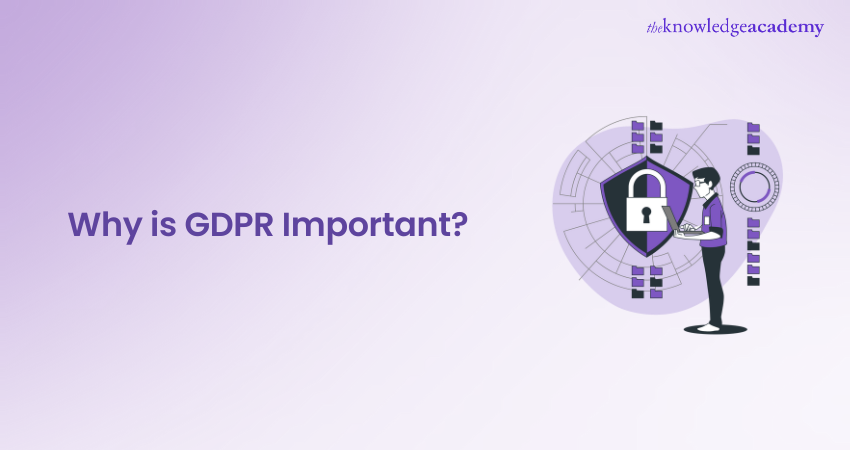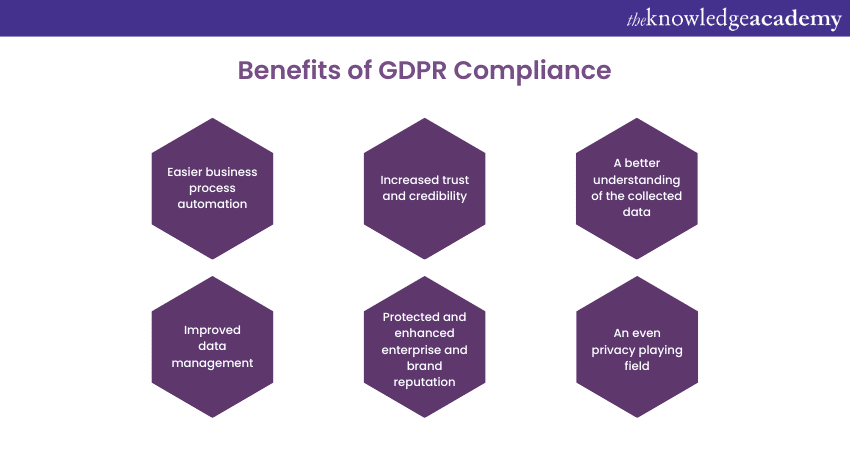We may not have the course you’re looking for. If you enquire or give us a call on +800 312616 and speak to our training experts, we may still be able to help with your training requirements.
Training Outcomes Within Your Budget!
We ensure quality, budget-alignment, and timely delivery by our expert instructors.

Have you ever wondered why is GDPR important? The General Data Protection Regulation (GDPR) law is essential because it gives individuals greater control over their personal data and enhances transparency and accountability for organisations that process such data. It is a necessary step towards protecting individual privacy in the digital age and ensuring that companies respect individuals’ fundamental right to data protection.
According to Capgemini's report on Championing Data Protection and Privacy, 85% of EU citizens are aware of GDPR, and 57% feel they have more control over their personal data since the regulation's introduction. In this blog, you will learn why GDPR is important. It is a set of regulations that protect users' and enterprises' privacy regarding personal data.
Table of Contents
1) What is GDPR?
2) Why is GDPR important?
3) How has GDPR affected marketing?
4) Need for Data Protection
5) Conclusion
What is GDPR?
The General Data Protection Regulation (GDPR), established in 2016 and enforced in 2018, is a globally influential security and privacy law. It sets standards for collecting and processing personal data from individuals within and outside the European Union (EU). Companies within the EU must follow GDPR regulations by always implementing and maintaining privacy settings, with regular GDPR audits to ensure compliance and safeguard customer data.
This rule applies generally, independent of the website's location, making it mandatory for sites that attract European visitors to comply, even if they do not openly target EU individuals. GDPR's basic goal is to give individuals control over their personal information while holding companies accountable for its management and protection.
Why is GDPR Important?
Benefits of GDPR helps to protect individuals' privacy rights, organisations are held accountable for their data processing activities, and trust is maintained in the digital economy. Let us now take a close look at the important points of GDPR:
Protects individual privacy rights
GDPR provides people more control over their data and the ability to erase their personal data when required. It guarantees individuals that all their personal data is protected using the legal process. GDPR provides specific rights that ensure individuals have complete access to their personal data. For example, an individual can request a copy of their data and choose to get it deleted if they find that any of their personal data is exploited.
Holds organisations responsible
Organisations must comply with the GDPR requirements to seek explicit consent before processing personal data. Additionally, they must put in place the necessary organisational and technical safeguards to ensure data security. They must also notify the public of any data breaches within 72 hours. The consequences of non-compliance might be severe fines and penalties.
Stay ahead of evolving data protection practices in the digital landscape with our specially designed GDPR Training.
Develops trust in the digital economy
The GDPR gives people more control over their personal data and holds companies accountable for how they use and handle it. A robust data protection framework promotes consumer confidence and increases the use of digital tools, which can, in turn, encourage investment, competitiveness, and development in the digital economy. This builds trust in the digital economy based on personal privacy, data security and good governance for digital products and services.
Encourages privacy by design
By requiring businesses to incorporate data protection into their goods, services, and operational procedures from the start, the GDPR and Data Protection Act promotes privacy by design. This indicates that privacy concerns are considered before, rather than after, the design and development phases. To ensure that their data protection policies are in line with GDPR, privacy by design requires organizations to do a privacy impact GDPR risk assessment., put the necessary organisational and technical safeguards in place, and regularly monitor and review their data protection procedures.
Streamlined approach
GDPR enables companies to implement a cohesive and efficient approach toward ensuring data privacy and security. It leads to easier business process automation. For example, streamlining data processing along with workflows and data cleanup.
Join our Certified EU GDPR Practitioner Course course now to become proficient in GDPR!
Prevents cyber-attacks
IBM's 2022 cost of data breach report highlights those cyber-attacks, including ransomware (a form of malware attack), have become increasingly devastating and expensive. Most data breaches occur in the cloud, where many organisations have shifted their infrastructure. Adhering to GDPR can help prevent such attacks, potentially saving significant costs for organisations in the future.
Incident response and disaster recovery
Disaster recovery involves restoring IT infrastructure and operations after a disruptive event, whereas incident response is the process of finding, managing, and resolving security incidents. They are among the most important elements to guarantee GDPR compliance. Incident response enables companies to be proactive and respond more efficiently to potential threats that may impact business continuity.
Toughest data protection regulation
GDPR leads to severe consequences for non-compliance because it offers the most stringent rules and guidelines for protecting the personal data of EU citizens. It requires clear and explicit consent for data processing and gives individuals greater control over their personal information.
How has GDPR affected marketing?
Marketing uses almost all the user information available on the internet. That is how they understand customer behaviour to send random messages, emails or ad pop-ups. After the implementation of GDPR, restrictions have been made on gathering and using people’s personal information.
Due to the restrictions imposed by GDPR, marketing companies now have to request permission before collecting any information that could identify individuals, like their name, email address, and IP address. This permission cannot contain anything hidden or tricky. Everything has to be mentioned clearly, and consent should be freely given. So, the boxes that are already checked without your consent will no longer be permitted.
These rules have significantly changed various types of communication, such as email marketing and multi-channel advertising. Especially the actions involved in collecting and using personal data were greatly impacted because they had to get permission before using personal data for marketing. This also applied to third-party cookies, which were the primary source used to track personal information.
Need for Data Protection

In today's digital age, the importance of safeguarding data has reached unprecedented levels. Nearly all organisations now possess vast amounts of customer and employee data, making data protection a paramount concern. The internet era has revolutionised data utilisation, allowing organisations to tailor marketing strategies based on individual search histories, preferences, transactions, and interests. Additionally, data can be controlled defensively to identify patterns indicative of fraud or other illegal activities.
Instances of irresponsible and reckless handling of personal data have recently come under intense public scrutiny, fostering a heightened awareness of data usage and potential misuse. While the General Data Protection Regulation (GDPR) primarily aims to establish safeguards against determining what is a data breach.
However, its implementation can also serve as a catalyst for transformative change within organisations. The process of adopting new data management structures and revising workflows can yield operational efficiencies and provide a foundation for data-driven insights.
Conclusion
We hope this blog gives you the right insights on why is GDPR important. GDPR drives organisational change, efficiency, and data-driven insights while creating opportunities for businesses to innovate and thrive in a data-driven landscape. Embracing GDPR is essential for protecting data, building trust, and unlocking the full potential of valuable information.
Enhance your organisation's data protection practices with our EU GDPR Awareness Training.
Frequently Asked Questions

The four key components of GDPR include data protection principles, rights of data subjects, obligations of data controllers and processors, and regulatory oversight and enforcement mechanisms.

The five clauses of GDPR encompass lawful processing, purpose limitation, and data minimisation. They also include accuracy and storage limitation, ensuring that personal data is processed lawfully, fairly, and transparently.

The Knowledge Academy takes global learning to new heights, offering over 30,000 online courses across 490+ locations in 220 countries. This expansive reach ensures accessibility and convenience for learners worldwide.
Alongside our diverse Online Course Catalogue, encompassing 17 major categories, we go the extra mile by providing a plethora of free educational Online Resources like News updates, Blogs, videos, webinars, and interview questions. Tailoring learning experiences further, professionals can maximise value with customisable Course Bundles of TKA.

The Knowledge Academy’s Knowledge Pass, a prepaid voucher, adds another layer of flexibility, allowing course bookings over a 12-month period. Join us on a journey where education knows no bounds.

The Knowledge Academy offers various GDPR Training, including Certified EU General Data Protection Regulation (EU GDPR) Foundation, GDPR Awareness Training and Certified EU General Data Protection Regulation (EU GDPR) Foundation And Practitioner . These courses cater to different skill levels, providing comprehensive insights into GDPR Scope.
Our IT Security & Data Protection Blogs cover a range of topics related to GDPR, offering valuable resources, best practices, and industry insights. Whether you are a beginner or looking to advance your Data Protection skills, The Knowledge Academy's diverse courses and informative blogs have you covered.
Upcoming IT Security & Data Protection Resources Batches & Dates
Date
 Certified Data Protection Officer (CDPO)
Certified Data Protection Officer (CDPO)
Thu 1st Jan 1970







 Top Rated Course
Top Rated Course



 If you wish to make any changes to your course, please
If you wish to make any changes to your course, please


